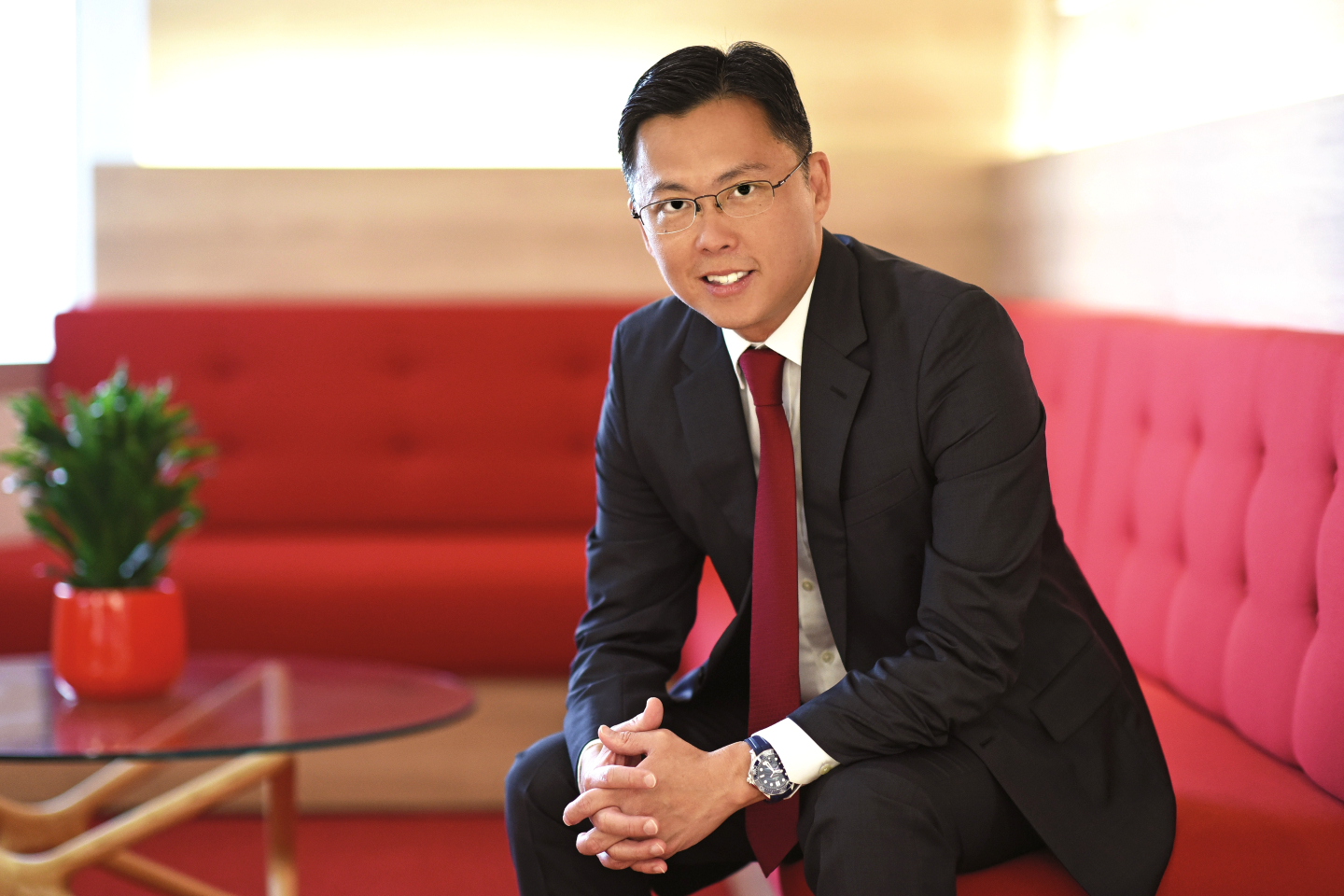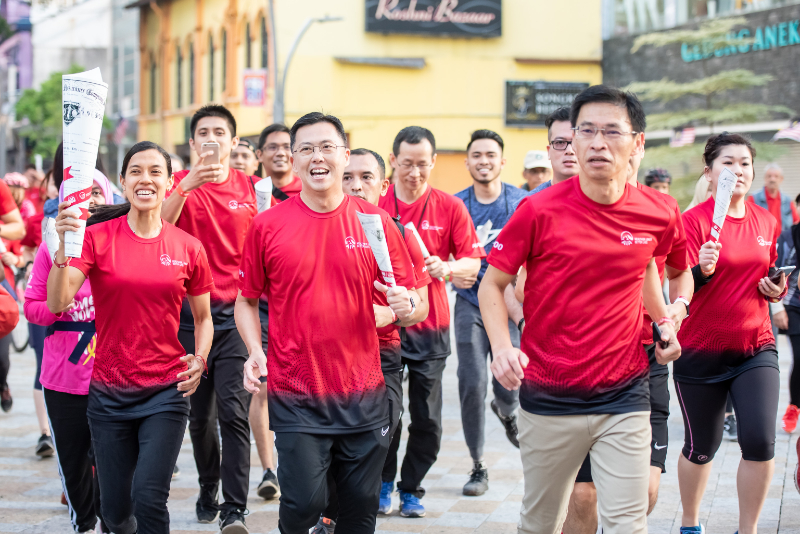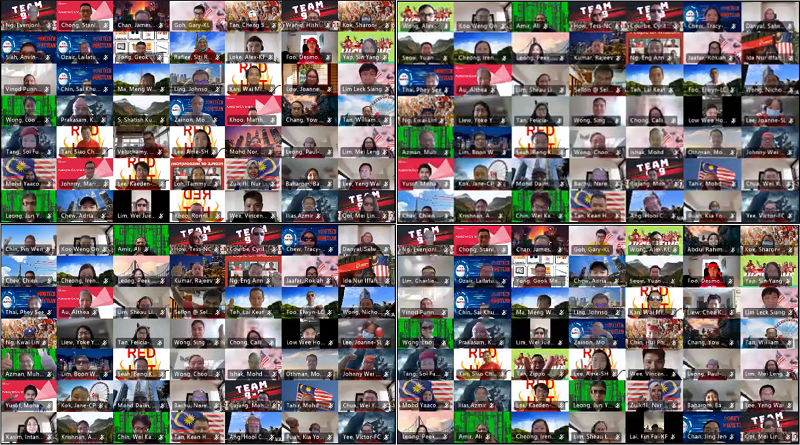
Ng joined the group in 2011 and was president director of AIA Financial in Indonesia from 2014 until his current appointment (All photos: AIA Malaysia)
Covid-19 has blunted the old saw that insurance is sold but not bought. In the last two years, fear of infection and hospitalisation has raised protection awareness and “insurance is bought very willingly now”, says Ben Ng, CEO of AIA Malaysia.
Looking at the company’s experience, there are no more lapses in premiums than before the crisis. In the takaful industry, where the bumiputera customer is newer to the concept of insurance, fewer people are lapsing in their payments.
People are prioritising expenditure, he notes, spending less on things such as eating out and travel but buying more insurance. Demand for both life and medical insurance has gone up and is more direct. The coronavirus has prompted people to think: What will happen if I am not here? “We get lots of calls from people asking about plans and updating their information,” says Ng.
Another positive turn is that instead of going around in circles, life planners go straight to the point when talking about insurance. “Covid-19 has facilitated this; it has truly changed the way people perceive insurance and we can talk to them about a career. Many life planners I speak to say, ‘Man, we are proud to be doing insurance now. We can be open’. We’ve managed to recruit lots of good talent. I’ve been in the industry for 25 years and never seen a shift of this magnitude.”
A recent KPMG survey on “Covid-19: Customer and Digitisation in Insurance” for Asian countries shows that interest in life and health products has increased since the pandemic and customers’ priority is to keep their products if a financial sacrifice is needed. Also, access to virtual healthcare services and healthcare providers is more important than cash payouts.
Ng says customers who own AIA’s newer medical plans will be covered if they are hospitalised due to the coronavirus. Those with older plans have the option to upgrade to newer versions, if possible.
In the last few years, the group has shifted from just protecting customers to something more significant: helping them live healthy first. Moving from the traditional practice of collecting premiums and paying claims should something unfortunate happen, it now strives to help people live better, longer and healthier lives through the digital and tech space.
AIA Vitality, the first science-backed wellness programme in the market launched in 2016, encourages people to live healthy and tracks their progress as they do so. Each person is assigned a status — bronze, silver, gold or platinum — that qualifies them for discounts and other benefits.
These are a kind of shared value, Ng explains. “If people make an effort to live healthy, we need to recognise that as well, in the form of lower premiums or higher benefits.”
Translating corporate purpose into the products the group offers is a commitment, pandemic or not. “Covid-19 has made our purpose more relevant than ever before,” he adds.
The Vitality programme also offers personal medical case management services, whereby customers get to talk to professionals who can help review their medical report and diagnosis and discuss treatment options instead of “consulting” family or friends who are not medical experts.
Another topic people hardly broach is mental health, a problem exacerbated by the lockdowns. Studies show that having quality and quantity rest and sleep can improve mental well-being. AIA Vitality tracks how many nights people sleep more than the recommended seven hours. An enhanced programme allows customers to take out money from a health wallet — if no claim has been made — to treat depression, bipolar or other forms of psychiatric disorders.
A telemedicine app lets people see physicians digitally while a consumer app enables them to check information such as types of policies, terms and beneficiaries. Within the latter is a financial health check, where consumers can ask questions about their income and liabilities. If there is a protection gap, they can explore how to close it.
“Truth is, most of the time, people are not aware of the insurance protection gap they have. Every time you ask them, ‘Got insurance ah?’ they say, ‘Got!’ Actually, what they have is usually inadequate,” Ng says.
The company’s digital innovations are primed to show life planners that insurance is a long-term, purposeful and rewarding career. “We believe in professional planners, not those who come in part-time or for a short time.”
Ng is proud that AIA Group is the No 1 MDRT (Million Dollar Round Table) company in the world for the seventh year running. MDRT is the standard of excellence in the life insurance and financial services business. And for a record-breaking six consecutive years, AIA Malaysia has had the highest number of MDRT members in the country. Globally, it is ranked 22 in the number of MDRT it has.
“I remember when I told my kids this, they asked: ‘You mean 22 in Asia?’ No, globally. ‘Are you sure?’ This is the biggest testament to our track record. Ya, it’s exciting and it keeps me going. As you can see, I get very passionate when talking about insurance.”
Ng says AIA’s head office in Hong Kong has people who constantly think about how to stay ahead and meet emerging customer needs. On his part, he encourages colleagues to not rule out anything — “Covid-19 has changed the world and you cannot use the past as reference points” — and is supportive of those who come up with new ideas. Like in May 2020, when someone suggested offering a simple insurance plan for which the company would pay the first three months of premium.
“It was the first such people-value plan in Malaysia and within the group. It came from my colleague, so I can’t take credit for it. It was very creative because people were afraid. We sent out a lot of policies and people are still paying for them today.”
Ng has two stories he holds close to his heart. At AIA Taiwan in 2009, the human resources chief knocked on his door one day and asked to talk to him. “My first thought was, he’s going to resign.”
The news was sadder: His colleague had just been diagnosed with colon cancer and could no longer work full-time because he had to focus on treatment. But he did not have enough insurance. Could the company continue to employ him until he died so his family could claim the group life insurance cover provided by AIA?
“That was extremely sad. We continued to employ him and he passed away in less than a year. His case gave me enormous energy and meaning to what I do.”
In 2013, when Ng was CEO for group corporate solutions in charge of employee benefits insurance business, he suggested to the then group CEO that, as an industry leader, AIA should consider income replacement.
When someone has a severe illness, medical expense is just the tip of the iceberg. If he makes RM20,000 a month and cannot work, that itself is opportunity cost of RM240,000 a year. He may need to hire a helper or change to an organic diet. “All these expenses you don’t see,” Ng says.
“The group CEO agreed and from that time on, in all our AIA countries, in addition to medical, we provide a group critical illness cover for our people — 18 times the salary if any of them suffers from a major illness like cancer or stroke — that supports not just hospital bills but also income replacement.
“Sometimes, action speaks louder than words — we rolled it out like that. It makes you feel this is a good company. I cannot use the word ‘pleased’, but it was good to see many colleagues diagnosed with critical illnesses over the years benefitting from this. I’m very passionate about insurance because it keeps me going.”
Insurance can also keep financial concerns at bay. At 27, Ng bought a S$1 million plan when he went to Singapore to work. “I had a few thousand Sing dollars but decided that the value of my life and the support of my family and parents was worth more than that. I bought the S$1 million cover so I didn’t have to worry about these things.”
Returning to head AIA Bhd in 2019, months before the Covid-19 outbreak, was a welcomed homecoming for Kuala Lumpur-born Ng. “To be honest, in times of crisis, there’s no other place I want to be than home,” he says.
“When I left Malaysia in 1997, I thought I would just go away for a few years and gain some experience — as people say, cham kor hum sui (Cantonese for ‘soak in salt water’, meaning to cross the ocean). I didn’t realise I would be gone 22 years. As a Malaysian leading a Malaysian company, I feel I can make more impact here.
“I’ve been CEO since 2008, in foreign lands. To be able to contribute to the community, support the local customers and my colleagues, and go through the crisis with my colleagues … seriously, as a Malaysian going through the worst crisis in a century, I feel grateful that I’m back in the country.” More so because both his sons are back home because of Covid-19 — “that’s kind of nice” — and waiting to resume their studies in the UK.
img-673_1_1.jpg

His predecessor had resigned and the position was open. “There is always a choice, but I thought, if they considered me, they must have thought I am a suitable candidate. I trust the company’s judgement, and Malaysia is my home. It has turned out to be the best decision because I’m not going to be stuck in another country in a pandemic like this.”
Ng joined the group in 2011 and was president director of AIA Financial in Indonesia from 2014 until his current appointment. Before Indonesia, he was CEO of AIA’s group corporate solutions business, and also regional business development director and interim CEO in AIA Taiwan.
The University of Nebraska-Lincoln graduate is a Fellow of the Society of Actuaries (FSA) and the Casualty Actuarial Society (FCAS). What these credentials do not disclose is that he became an actuary by accident!
Ng says he grew up in an ordinary family: both his parents worked and he was left in grandma’s care. “From young, I knew I had to work hard and hopefully better our financial circumstances, for my parents, myself and my family. I didn’t have lots of advice in terms of the optimal next step or choices in life.”
When he went to college, he happened to meet an administration assistant who noticed his good maths and science results and asked why he wanted to study business. He told her he did not want to be an engineer.
“This lady said, ‘Why don’t you study actuarial science? It combines business and maths and there’s good income’.
“I didn’t fully know what I was getting myself into but for someone from a middle-income family, hearing ‘good income’ is like a rabbit seeing a carrot. That was how I started, and I’ve stayed throughout the years.”
During boyhood, Ng was one of those children who hid behind mum’s skirt. “I was very shy, very introverted. After I graduated and interacted with others, I was more at ease.”
Was he the typical nose-in-a-book geek?
“I guess I was, for a start. I tended to study a lot, do a lot of maths. But it was good lah. Actuarial science trains your logical and analytical mind. At the early stage of my career, the logical thinking was very useful.
“Once you enter the workforce, you realise that in math, there is only one answer, the correct answer. But in real life, there is more than one correct answer. That was my transition from a technical person to, eventually, a general manager and then a CEO.”
Managing people involves approaching them and getting them to perform. In that respect, he is influenced by the AIA leadership framework, which comprises three essential threads — clarity, courage and humanity — and shapes the behaviour and development plan of all senior executives.
Under clarity, the company specifies that everybody must embrace its purpose — help people live healthier, longer, better lives, and put customer experience first, with a digital-first mindset. Day to day, that means thinking of ways to make it easier for customers to interact with agents and life planners, and using technology to communicate products more efficiently.
Ng is particularly drawn to the next thread. “I love the courage part — in times of crisis, you’ve got to take some bold moves. I read this quote: Courage doesn’t mean you are not afraid, but you don’t let the fear stop you from what you should be doing. I think the group encourages people to be courageous.”
As for humanity, he knows the first thing that every corporate leader needs to know: People are the No 1 asset for any company.
onetech-oneteam2021-d2.png

“Throughout this period, my top priority is not the product but to make sure our staff are safe and healthy. We moved people to work from home and approved 1,000 laptops in March last year — it was just sign and buy. We went the extra mile by installing UV filters in all the office air-conditioning to hopefully reduce the natural virus spread.
“We have this operating principle to do the right thing, the right way, with the right people,” says Ng, who reminds colleagues that any time they think the company is not doing the right thing, they can approach him, without an appointment.
Looking after people; coaching them and helping them grow; building trust; providing honest feedback and gathering honest feedback as well — “We hold ourselves up to this high standard.”
He thinks the leadership framework is vital because “insurance is a long-term contract. AIA is 102 years old this year, so it’s important that we have a strong culture and be forward-looking”.
People use the word “agile” for IT projects. AIA is taking the agile concept to the whole organisation and has committed to a major investment for that, Ng says.
“We’re looking to hiring 500 technology, digital and analytics resource to support our digital ambition in the next three years. So, I also have to learn and embrace new ways of working.”
The prolonged pandemic and various forms of Movement Control Order (MCO) have accelerated remote work and e-commerce. Because of that, Ng feels Malaysia will be among the Asean countries with higher digital adoption.
His personal aspiration for AIA Bhd is “to be a centre for best practices and innovation. Hopefully, we can be a good talent provider for the group as a whole”.
Fifty this year, Ng finds a lot of meaning in what he does. “I’m happy where I am and very proud of the company I work for. Even my kids are too — I’m in a good place. What I enjoy is the continuous learning. It’s exciting and I have no time to think of other things.”
How about time for leisure?
“Of course. I like to sleep. We give Vitality points to people who sleep a certain number of hours a day. So I try to time myself to get seven hours nightly. The best thing that can happen during the weekends is to wake up without [need for] the alarm.”
Ng enjoys exercising and used to follow a full routine, from stretching to running to swimming. The MCOs have kept him from the pool but he still runs to stay active.
“I also like to reward myself with a nice meal and a glass of nice wine. Very simple, nothing fancy. Because I’m an actuary, l like routine … it’s good for me. The occasional surprise is okay, but I can’t take surprises every weekend. I like to be a bit more predictable.”
New Age is his kind of music, although often, he ends up listening to more current songs — “my colleagues are very impressed” — put in his playlist by his children.
He reads books on leadership and coaching to equip himself to help people grow and be better than they are, “if they so aspire”. Executive summaries and Instaread offer key points he can digest on the treadmill or while doing stretching exercises.
Vitality says you need to be in the cardio zone for 30 minutes to get maximum points, so he sets the machine for 35 minutes. Watching a movie or listening to something he enjoys boosts his persistence to cross that zone.
He likes thrillers and horror flicks and comedy, depending on his mood. “I just like to watch good movies with good acting. I enjoy surprise endings. In life I like predictability, but not when it comes to films.”
This article first appeared on Sept 27, 2021 in The Edge Malaysia.


